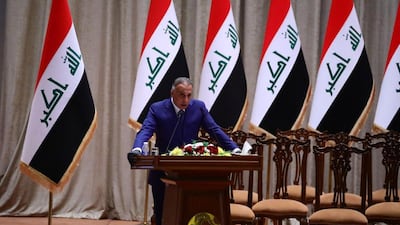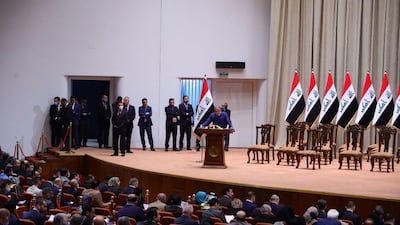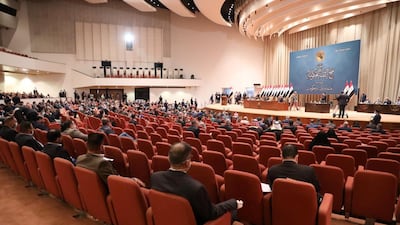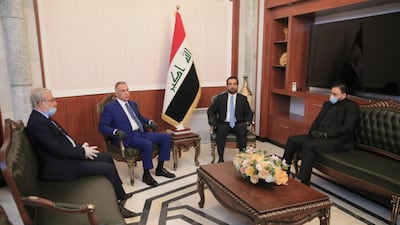It was a bold opening gambit from new Iraqi Prime Minister Mustafa Al Kadhimi. On the night of May 10, protesters gathered outside the offices of a little known militia organisation in Basra, Thar Allah.
When they were met with live fire, it seemed a typically brutal response from Iraq’s numerous Iran-backed militias, whom many hold responsible for killing hundreds of protesters.
What happened next surprised observers: Thar Allah’s offices were raided by security forces, although their leader, Youssef Al Musawi, was not present at the scene of the raid. Mr Al Kadhimi later tweeted that the raid had been executed on his personal orders and that “those who spill Iraqi blood will not rest.”
The new PM has promised to re-establish rule of law. This means reining in powerful elements of Iraq’s Popular Mobilisation Forces (PMF), some of which are linked to Iran.
For now, the new policy could have some momentum following developments in recent weeks. PMF groups linked to Iraq’s religious authorities (sometimes called the Shrine PMF) have voluntarily moved towards stronger government control.
Meanwhile, Iran-backed groups such as the notorious Kataib Hezbollah continue to violate Article 9 of Iraq’s Constitution, which outlaws political activity in the armed forces and mandates strong civilian control of the military.
So does the Thar Allah raid mark a new era? The most important point to consider is that Thar Allah is not within the PMF and nowhere near as strong as Kataib Hezbollah. They have no direct connection to the Iraqi government but share the outlook of the late Abu Mahdi Al Muhandis, the Iran-backed militia leader killed in a US drone strike on January 3.
According to PMF expert Inna Rudolf, the new Iraqi premier’s order for the raid could be, “a signal meant to discourage outsourcing of resistance activities, which would allow to keep the PMF statist and neat while others play spearhead and convey certain messages.”
The raid could therefore represent a warning to other, smaller militias, giving the PM some leverage by creating uncertainty surrounding the fate of those who do not follow government orders.
A fringe movement
Once a typical Iran-proxy, Thar Allah emerged from an array of exiled anti-Saddam Hussein opposition groups in Iran, such as the Badr Organisation, Iran’s oldest proxy in the country, and the Islamic Supreme Council of Iraq (ISCI). Thar Allah ran with ISCI an election coalition in 2005, when ISCI was known as the Supreme Council for Islamic Revolution in Iraq.
After the US invasion in 2003, the group benefited from Iran’s early policy in Iraq of “betting on all the horses”. A 2005 leaked US army report mentions the group as being involved in the assassination of Sunnis in Basra, part of Iran’s ruthless strategy at the time to cement hegemonic control in Iraq’s south and wipe out any trace of their former foes, the Iraqi Baath party.
British soldiers reported in December 2003 finding a Thar Allah “torture chamber” in Basra.
Unsurprisingly, the group’s brutal tactics fanned the flames of civil war. This situation wasn’t helped by the fact that the British army initially thought the group was merely a local extremist organisation amid a much larger insurgency.
As late as 2007, Thar Allah received Iranian financial support, according to leaked State Department cables, alongside groups such as the now defunct Jaish Al Mahdi, followers of populist cleric Moqtada Al Sadr. By then, Basra was crumbling amid an array of rival militias, running mafioso style operations.
As the occupying British army lost control of southern Iraq, Thar Allah became embroiled in a vicious feud with the rival Shia Fadhila Party. Much was at stake, from controlling extortion rackets to oil smuggling.
In a desperate attempt to bring rival factions together, the Iraqi government and the British army agreed to have Al Musawi on a newly formed Basra Security Committee, despite his involvement in death squads.
Unsurprisingly, the effort quickly fell apart, but it is strangely absent from the official British inquiry into the Iraq war, the 6,000 page Chilcot Report. The report does however mention the failed Security Committee, described at the time by British Major General Sir Richard Shirreff as "no longer fit for purpose."
It is around this time that the group appears to have over-reached, probably because Iran had become wary of seeing its proxies clash, undoing Tehran’s project of political hegemony in Iraq.
As former PM Nouri Al Maliki, himself a Shiite, sent Iraqi forces to retake Basra from the Jaish Al Mahdi in 2008, Youssef Al Musawi fled to Iran where he reportedly remained until 2014, when the PMF formed to fight ISIS. Little is known about his time there.
As pro-Iran militias mobilised for war, Iranian support was not forthcoming for Thar Allah, which was absent from the major battles with ISIS.
This led Al Musawi to remould himself as a modern, clean cut politician, cultivating an image more like an accountant than a warlord. His Facebook page shows glossy campaign material but the posts are very much on message with Iranian propaganda, blaming the US for protests across Iraq.
Al Musawi also appears to have tried to rebuild political connections, praising former Islamic Supreme Council of Iraq leader Ammar Al Hakim on the founding of his breakaway Al Hikma party. But these efforts were to no avail.
Cut off from political support, Thar Allah had become an easy target for the new government. The question now remains, is this a new era for rule of law in Iraq, as Mr Al Kadhimi promised, or a symbolic move that may not deter groups such as Kataib Hezbollah? Only time will tell.











